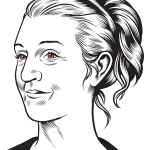Rebecca Solnit is the author of twelve books. She is a journalist, essayist, environmentalist, historian, and art critic; she is a contributing editor to Harper’s, a columnist for the environmental magazine Orion, and a regular contributor to Tomdispatch.com and the Nation; she’s also written for, among other publications, the L.A. Times, the San Francisco Chronicle, and the London Review of Books. Over the past two decades, her inventive and accessible style has found a readership across the wide public-to-academic spectrum. To give an indication of this appeal, River of Shadows: Eadweard Muybridge and the Technological Wild West (2003)—her book on the history of photography, the dawn of the cinematic West, and more or less the annihilation of space and time—was awarded both the National Book Critics Circle Award in Criticism (on the public side of the spectrum) and a prize from the Society for the History of Technology (those tenure-wise academics).
Throughout her career, Solnit’s emphasis has been on the political qualities of art and the environment, the artistic elements of nature and politics, and the meanderings of humans in and out of those combinations. Maybe that was a rhetorical flourish on my part, but the bigger picture of her work is this notion of meandering. If nothing else, Solnit was born a wanderer. You find it in the “walking” theme of Wanderlust: A History of Walking (2000), the intellectual wandering theme in A Field Guide to Getting Lost (2005), and the implicit physical and metaphysical meandering that is the topic of dozens of her essays and stories. We corresponded about all of this by email last year, as she was working on her new book, A Paradise Built in Hell: The Extraordinary Communities That Arise in Disaster, released this August. Our main challenge was to set that wandering theme into her body of work in just the right way. But it’s a challenge in a good way for readers, encouraging them to follow along on literary tours and to find new vistas by turning unexpected corners.
You have reached your article limit
Sign up for a digital subscription and continue reading all new issues, plus our entire archives, for just $1.50/month.
Already a subscriber? Sign in





